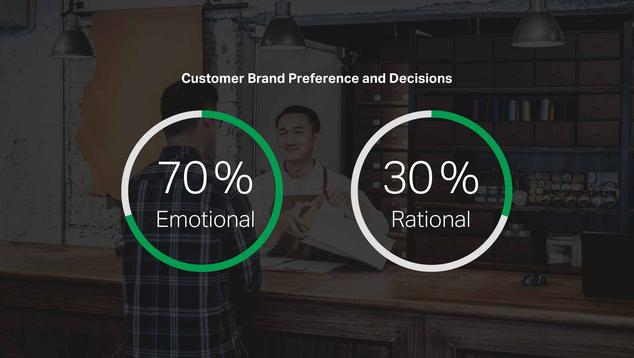Story Highlights
- 70% of decisions are based on emotion, including brand preference
- Gallup's research helped shape the field of behavioral economics
- Focus on the emotional decision-making of both customers and employees
What motivates consumers to stay loyal to a brand? Are consumers primarily rational actors, looking to maximize benefits for themselves? Or are they driven by impulse, passion and feeling?
Scientists have studied this question for decades, using a variety of different methods. Gallup's own research has found that about 70% of decisions are based on emotional factors and only 30% are based on rational factors.
This challenges traditional economic theorists' view that individuals work as rational actors. Nevertheless, a body of scientific evidence has repeatedly supported Gallup's customer engagement research.
Gallup's own research has found that about 70% of decisions are based on emotional factors and only 30% are based on rational factors.
These insights have been a central factor in the development of the field of behavioral economics, which studies the interplay among rational, perceptual and emotional processes in decision-making.
The Consumer Decision-Making Process: Rational or Emotional?
Two Gallup studies provide evidence to support this 70/30 principle when it comes to consumer decision-making.
In the first study, Gallup scientists wanted to know which factors drove customer engagement for a luxury hotel brand. Were physical attributes, such as the condition of the room and furnishings, most important? Or were emotional attributes, such as feeling welcomed and valued, more important? Ultimately, Gallup found that emotional elements accounted for 65% to 70% of the variance in customer engagement.
In the second study, Gallup partnered with Nihon University to combine engagement data with BOLD fMRI imaging techniques. Researchers examined the brain scans of customers with high brand engagement and found that when asked about the brand, the emotional centers of their brain (particularly those associated with passion) were activated. Based on his own brain imaging research, neuroscientist Edmund T. Rolls suggested the brain images were able to predict purchasing decisions with 70% accuracy.
Improving Your Customer Engagement Strategy
What implications do these findings have for business leaders who want to improve consumer brand loyalty?
1. Prioritize the emotional experiences of clients and customers. This means going beyond numbers like satisfaction ratings or net promoter scores, which are ubiquitous metrics but difficult to take meaningful action on. Better survey items do exist. Feelings and emotions may feel too abstract for some leaders, but measuring and monitoring customers' predictive psychological dispositions can be done effectively using scientifically valid tools and methods.
2. Pay special attention to employee-customer interactions. Gallup's work with clients in the financial sector has found that high-quality conversations between employees and customers are the primary driver of sales conversions. Although these touchpoints may be fewer in the digital age, they are still the most emotionally engaging. The consequence of this insight is profound: The psychological engagement of your customers is directly linked to the psychological engagement of your employees.
3. Partner with advisers who have scientific expertise in behavioral economics. To know that emotions matter is one thing; to leverage your own customer engagement insights to make critical business decisions is another. How do you know if you have a quality analysis -- and how should you interpret it in light of your unique organizational culture and market environment? Applying behavioral economics is complex, and it requires knowledgeable advisers to do it correctly.
Deliver outstanding customer experiences that build brand loyalty:
- Learn about Gallup's framework for customer centricity today.




